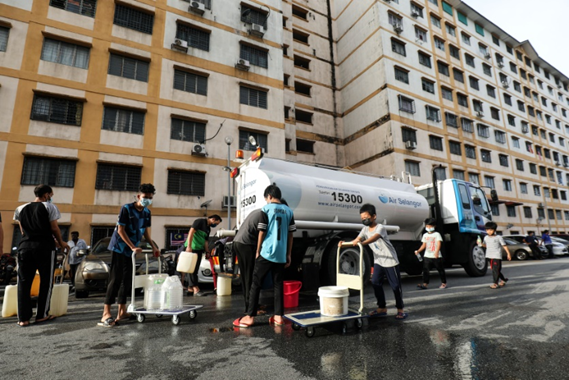Water Sector Transformation Agenda 2040 (WST2040)
Under the 12th Malaysia Plan, the WST2040 aspires to “transform the water sector from an economic enabler into a dynamic economic sector as the future direction of national growth”. The project comprised of 8 taskforces that span the areas of education and advocacy to the water-food-energy nexus and climate change impacts.

The Economic Planning Unit (EPU) of the Government of Malaysia has partnered with expert advisors and researchers from the Institute for Global Strategy and Competitiveness at Sunway University in a study that span the areas of education and advocacy to the water-food-energy nexus and climate change impacts.
Water as an Economic Sector
In 2020, the Academy of Sciences Malaysia was appointed by the EPU as its strategic partner to undertake the Study on Water Sector Transformation Agenda 2040 (WST2040), to transform the water sector from an enabler to becoming a dynamic growth engine by 2040, as stated in the 12th Malaysia Plan (12th MP).
The nation aims to achieve a secure, sustainable, and vibrant water industry in Malaysia, to forge it into a dynamic, efficient, sustainable, and revenue-generating industry. The five focused areas of WST2040 are empowering people as the drivers of the transformation, strengthening governance, enhancing data-driven decision-making, ensuring sustainable financing, and developing sustainable and cost-effective infrastructure.
This study, led by researchers at the Institute for Global Strategy and Competitiveness at Sunway University, and done in collaboration with the Academy of Sciences Malaysia, introduced an ecosystem approach to transform the water sector into a dynamic economic sector while ensuring water security and sustainability. This is built upon the 8i-innovation framework, 8R Philosophy of Water, and the 10-10 MySTIE Framework.
Implementing WST2040 and following the recommendations made by the study will contribute significantly to the national gross domestic product (GDP), create new job opportunities and facilitate the development of science, technology, innovation, and economy (STIE), which in turn will enhance the research, development, innovation, and commercialisation (RDIC) of indigenous new products for both the national and global platforms. This transformation agenda is planned over 2 decades and 4 phases of four 5-year Malaysia Plans (MP), starting with the 12th MP.
The WES Sub-Sector study proposes an ecosystem approach that matches the 8i-ecosystem framework of infrastructure, infostructure, intellectual-capital, integrity systems, incentives, institutions, interaction, and internationalisation to the five focused areas of WST2040. It assesses the current contribution of the water sector to the economy and highlights several areas of the water sector that can increase its contribution to the Malaysian economy. The study which concluded in 2021, also highlights several gaps in the enablers of the water ecosystem. Several strategies are being proposed to increase civic consciousness on water resource management among all stakeholders and to strengthen water sector governance by adopting a “Whole of-Government & Whole-of-Society” approach.
By leveraging on the knowledge and expertise of stakeholders in academic, government as well as industry, the findings and holistic recommendations are believed to be greatly relevant to the current water landscape of the country.




